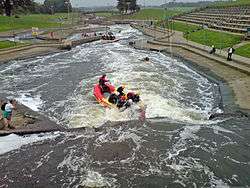Artificial whitewater


An artificial whitewater course (AWWC) is a site for whitewater canoeing, whitewater kayaking, whitewater racing, whitewater rafting, playboating and slalom canoeing with artificially generated rapids.
Course types
Three main types of course exist:
Flow diversion
These work by diverting a natural river through boulder placement or damming, or by creating new channels next to an existing river, possibly by a weir or power station outflow.
Tidal action
Created in estuaries with large tidal reaches, on a barrage across the river. The barrage is opened during a rising high tide to allow the sea water in, then shut as the tide turns. The water stored above the barrage is then forced through an artificial channel to provide water features.
Pumped
The nature of artificial whitewater courses necessitates the need for a drop in the river, and enough water flow to provide hydraulics. When this isn't possible (often in flat low-lying areas), electric pumps are used to lift and re-circulate the water to the top of the course. The shapes of these courses are commonly circular or U-shaped.
Pumped courses are extremely expensive to run, typically 1-2 megawatts of electrical power are needed to pump 15 cubic metres per second of water down a course with a 5-meter drop in height.
Olympic whitewater courses
- 1972 - Eiskanal in Augsburg, Germany flow diversion
- 1992 - Parc Olímpic del Segre in La Seu d'Urgell, Spain, flow diversion/pumped
- 1996 - Ocoee Whitewater Center near Copperhill, Tennessee, USA, altered riverbed
- 2000 - Penrith Whitewater Stadium, near Sydney, Australia pumped
- 2004 - Helliniko Olympic Canoe/Kayak Slalom Centre, Athens, Greece pumped
- 2008 - Shunyi Olympic Rowing-Canoeing Park, Beijing, China pumped
- 2012 - Lee Valley White Water Centre, London, England pumped
- 2016 - Olympic Whitewater Stadium, Rio de Janeiro, Brazil pumped
Other notable courses
- Adventure Sports Center International in McHenry, Maryland, USA pumped
- Canolfan Tryweryn near Bala, Gwynedd, North Wales natural flow modifications
- Cardington Artificial Slalom Course near Bedford, England flow diversion
- Dickerson Whitewater Course in Dickerson, Maryland, USA pumped
- Dutch Water Dreams in Zoetermeer, Netherlands pumped
- Holme Pierrepont in Nottingham, England flow diversion
- U.S. National Whitewater Center, near Charlotte, North Carolina, USA pumped
- Nene Whitewater Centre in Northampton, England pumped
- Rutherford Creek in British Columbia, Canada flow diversion
- Tacen Whitewater Course near Ljubljana, Slovenia flow diversion
- Teesside White Water Course in Stockton-on-Tees, England tidal
- Water Sports Centre Čunovo near Cunovo, Slovakia flow diversion
- Canal de Aguas Bravas, Luis Buñuel Water Park, Zaragoza, Aragon, Spain.
- Wadi Adventure in Al Ain, Abu Dhabi, UAE. pumped
Under planning or construction
- Rio de Janeiro for the 2016 Olympics pumped

.jpg)
